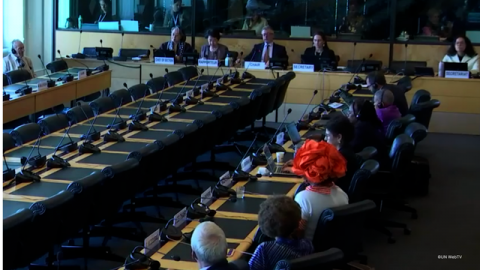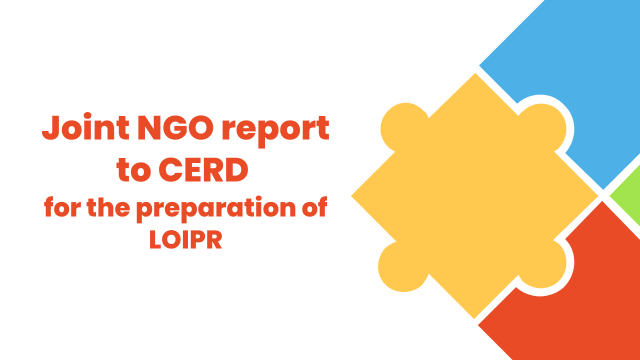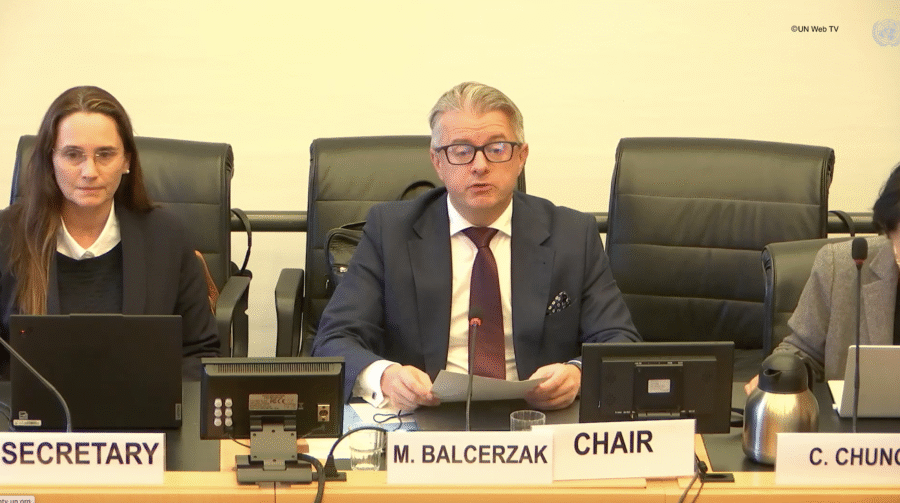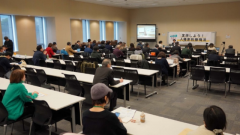CERD 115th session summary: Gabon, Kyrgyzstan, Mauritius, the Republic of Korea and Ukraine
May 14, 2025

From 22 April to 9 May 2025, the UN Committee on the Elimination of Racial Discrimination (CERD) held its 115th session.
During the session, CERD reviewed and adopted concluding observations on the reports of Gabon, Kyrgyzstan, Mauritius, the Republic of Korea and Ukraine.
Highlights of the session included:
- Follow-up reports for Croatia, Germany, Morocco, Uruguay and Tajikistan were reviewed.
- Work was done to develop a joint general comment/recommendation on addressing and eradicating xenophobia and its impact on the rights of migrants, their families and other non-citizens affected by racial discrimination.
- A half-day general discussion to develop its general recommendation on reparations for the injustices of the transatlantic trade in enslaved Africans, their treatment as chattel, and the ongoing harms to people of African descent was held.
- Four cases were considered under the individual complaints procedure, and one was declared admissible.
- Under its Early Warning and Urgent Action procedure, 16 submissions were considered, 13 letters were endorsed to the State parties assessed, and a statement was issued on the Catastrophic Humanitarian Crisis in the Occupied Palestinian Territory on 9 May.
This year, the International Convention on the Elimination of All Forms of Racial Discrimination marks its sixtieth anniversary, and CERD launched the yearlong campaign.
Concluding observations and reports of the State parties and other stakeholders are available on the session’s webpage. Video archives of the public meetings can be accessed at UN Web TV.
Gabon
Gabon held its constructive dialogue with CERD on 30 April and 1 May 2025, and CERD concluded its consideration of the 10th periodic report of the State. While the Committee recognised efforts to promote the rights of Indigenous Peoples, it expressed concerns over the absence of a specific legislative framework and a definition of racial discrimination in line with Article 1 of ICERD.
In its concluding observations, among other things, the Committee pointed out reports of displacement without free, prior and informed consent as well as the harmful effects of infrastructure and resource projects on Indigenous livelihoods and lands. The Committee urged the State party to take measures to guarantee recognition, non-discrimination and legal protection of Indigenous Peoples. The Committee also called for establishing a law to govern consultation procedures.
The Committee issued recommendations on the following topics:
- Statistics
- Application of the Convention in the domestic legal order
- Legislation prohibiting racial discrimination
- Institutional framework
- National action plan to combat racial discrimination
- Application of Article 4 of the Convention
- Racist hate speech
- Human rights defenders and civil society organisations
- Combating racial discrimination and structural inequalities(*Follow-up)
- Rights of Indigenous Peoples(*Follow-up)
- Foreign nationals
- Situation of non-citizens, in particular migrants, asylum-seekers and refugees
- Trafficking in persons
- Legal and institutional framework relating to asylum
- Statelessness
- Complaints about racial discrimination and access to justice
- Human rights education to combat racial discrimination
Kyrgyzstan
On 1 and 2 May 2025, the Committee held its constructive dialogue with the State delegation of Kyrgyzstan and adopted its consideration of the combined 11th and 12th periodic reports. The Committee raised questions about reports of the rise in hate speech and violent attacks by civilians against migrants in May 2024.
In concluding observations, among other things, the Committee asked for effective, thorough and impartial investigations into all alleged abuses and to properly prosecute perpetrators and punish those convicted. It also called upon the State party to take effective measures for combating and monitoring hate speech, incitement to hatred and discrimination against migrants, including in digital space.
The Committee issued recommendations on the following topics:
- Statistics
- Convention in the domestic legal order
- Prohibition of racial discrimination
- National human rights institutions
- Hate speech and hate crimes
- Complaints of racial discrimination, hate speech and hate crimes(*Follow-up)
- Racial profiling
- Civic space
- Accountability for the 2010 ethnic violence
- Women belonging to ethnic minority groups
- Lesbian, gay, bisexual, transgender and intersex persons belonging to ethnic minority groups
- Mugat ethnic community(*Follow-up)
- Ethnic minorities in political and public affairs
- Access to education in minority languages
- Right to health
- Refugees and asylum-seekers
- Stateless persons(*Follow-up)
- Migrant workers
- Violent attacks against non-citizens
- Training, education and other measures to combat prejudice and intolerance
Mauritius
Mauritius had a constructive dialogue with the Committee on 28 and 29 April 2025, and the Committee concluded its consideration of the 24th and 25th periodic reports. While the Committee noted the State party’s view that keeping disaggregated statistics by ethnicity goes against National Unity, it raised concerns about the lack of detailed data on ethnic groups and the ongoing effects of forced displacement of the Chagossians.
In concluding observations, among others, the Committee indicated particular concerns that the absence of comprehensive data on ethnic groups such as Creoles, Chagossians, and other people of African descent, as well as non-citizens, including migrants and stateless people, impedes effective assessment of racial discrimination and their socioeconomic status. The Committee recommended developing inclusive data collection tools based on self-identification, compiling detailed socioeconomic statistics, and publishing data on the ethnic composition of prisoners.
The Committee issued recommendations on the following topics:
- Statistics
- Status of the Convention in the domestic legal order
- Equal Opportunities Act
- Intersectional discrimination
- Institutional framework
- Legal provisions on racial hatred and the prohibition of organisations that promote racial discrimination (*Follow-up)
- Structural discrimination and special measures (*Follow-up)
- Public and political participation
- Truth and Justice Commission
- Creoles
- Situation of the Chagossians
- Situation of migrants, refugees, asylum seekers and stateless persons
- Migrant workers
- Trafficking in persons(*Follow-up)
- Racial profiling and the Independent Police Complaints Commission
- Combating racist prejudice, stereotypes and legacies of slavery
The Republic of Korea
The constructive dialogue took place on 29 and 30 April 2025, and the Committee concluded its consideration of the combined 20th to 22nd periodic reports of the Republic of Korea. The Committee questioned the rise in racist hate speech and widespread exploitation of migrant workers.
In concluding observations, the Committee, among other matters, remained concerned over the rise in racist hate speech, especially targeting migrants, asylum seekers, refugees, Muslims and people of Chinese descent. It was alarmed by reports of hate incidents, including the cases of opposing the construction of a Daegu mosque, as well as videos of the abuse of undocumented migrant workers posted on the Internet. The Committee called upon the State party to amend its Criminal Code to acknowledge racist motivations as aggravating factors, explicitly criminalise hate speech and hate crimes, condemn all forms of hate speech, strengthen legal training and increase efforts to counter hate speech in digital space.
The Committee issued recommendations on the following topics:
- Statistics
- Convention in the domestic legal order
- National human rights institution(*Follow-up)
- Prohibition of racial discrimination
- Complaints of racial discrimination
- Hate speech and hate crimes(*Follow-up)
- Migrant workers
- Undocumented migrants
- Access to education
- Access to social security
- Immigration detention
- Asylum-seekers and refugees
- Discrimination faced by escapees from the Democratic People’s Republic of Korea
- Migrant women
- Trafficking in persons
- Treatment of migrants in the context of disasters and health emergencies
- Birth registration(*Follow-up)
- Pathways to secure residency status and citizenship
- Stateless persons
- Training, education and other measures to combat prejudice and intolerance
Ukraine
The constructive dialogue took place on 23 and 24 April 2025, and the Committee adopted its concluding observations on the combined 24th to 26th periodic reports of Ukraine. While the Committee indicated concerns over the ongoing war posing serious challenges for the State party to fully implement its obligations under ICERD, it pointed out the absence of information on incidents of discriminatory treatment and reports of hate crimes against Roma communities.
In concluding observations, among others, the Committee expressed particular concerns about the absence of information on investigations, prosecutions, convictions, and sanctions regarding incidents of discriminatory treatment, racist hate speech, and violence against people of African, Asian, Middle Eastern, and Latin American descent while they attempted to flee neighbouring countries, including denial of access to bomb shelters, obstruction at border crossings. The Committee urged the State party to investigate all such incidents, prosecute those responsible, and ensure appropriate punishment.
The Committee issued recommendations on the following topics:
- Statistics
- Legal framework on the prohibition of racial discrimination
- Policy and institutional frameworks
- Hate speech and hate crimes
- Complaints of racial discrimination, including hate speech and hate crimes
- Racial profiling and racially motivated violence by law enforcement
- Ethnic minority groups
- Roma
- Racially motivated attacks against Roma communities
- Right to freedom of thought, conscience and religion
- Indigenous Peoples
- Application of the Convention in the context of the ongoing war
- Internally displaced persons(*Follow-up)
- Refugees and asylum seekers(*Follow-up)
- Stateless persons(*Follow-up)
- Human rights education to combat prejudice and intolerance
Summaries of the concluding observations can be found here.
*The next session is going to take place from 11 to 29 August 2025 to review the reports of Burundi, Guatemala, Maldives, New Zealand, Sweden and Tunisia.





